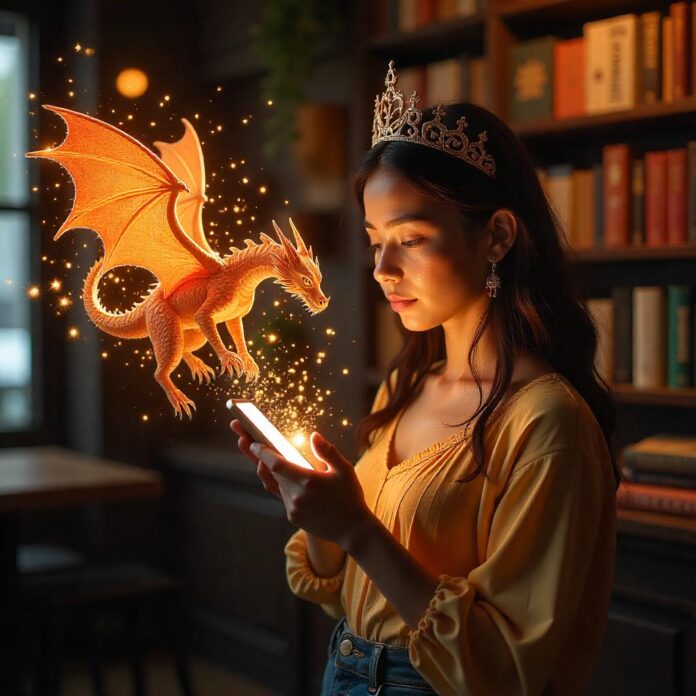The literary landscape has transformed almost overnight—dragons soar through TikTok feeds, faerie courts dominate bestseller lists, and “romantasy” has become a cultural force rewriting publishing rules. This isn’t just a trend; it’s a revolution where fantasy’s epic scale collides with romance’s intimate intensity. Forget subplots; here, love stories are the quest, and magic systems heighten every heartbeat. Let’s explore how this fusion genre became your social media obsession and reshaped what we read, why we crave it, and what it says about us.
Decoding the Fantasy-Romance Fusion Phenomenon
Romantasy isn’t “fantasy with kissing.” It’s a deliberate genre hybrid where romantic relationships drive the narrative with equal weight to world-building. While traditional fantasy might relegate romance to a side arc, romantasy makes emotional bonds the engine of plot progression. The magic isn’t just backdrop; it’s interwoven with desire, power, and vulnerability. Consider dragon bonds that amplify human emotions or magical mate bonds dictating political alliances.
The Trope Lexicon Driving Obsession
| Trope | Example | Psychological Hook |
|---|---|---|
| Enemies to Lovers | Feyre & Rhysand | Cathartic tension release |
| Fated Mates | Fourth Wing dragon bonds | Destiny validation |
| Forbidden Magic Love | Divine Rivals rivals | Taboo transgression thrill |
| Rebellious Royalty | Thorns of the Moon Court | Power dynamics as foreplay |
The Numbers Behind the Revolution: Romantasy’s Market Domination
Science fiction/fantasy sales surged overwhelmingly fueled by romantasy. The genre generated significant revenue growth, outpacing general fiction. Specific titles achieved remarkable sales figures as top overall bestsellers, outselling established literary giants.
Romantasy’s success is cannibalizing other categories. Romance and erotic fiction sales rose significantly, while nonfiction declined. Even non-romantasy fantasies now get rebranded with romantasy covers for discoverability. The power shift is stark, with romantasy authors outselling prestigious literary award winners.
Indie Publishing Revolution
Independent writers bypassed traditional gatekeepers via social platforms, proving self-published titles can rival major publishing house releases through direct reader engagement strategies.
BookTok: The Algorithmic Fairy Godmother
BookTok isn’t just social media—it’s a precision tool for romantasy virality. Key tactics include micro-trope snippets where creators isolate specific scenes, aesthetic flooding through fantasy casting videos and mood boards, and communal live reactions to plot twists that foster shared euphoria.
Publisher-Content Creator Symbiosis
Publishing companies now deploy dedicated teams monitoring real-time reactions. When specific fantasy-romance scenes trended, the industry response included accelerated special edition print runs, adoption of fan-coined terminology in official marketing, and remarkable sales resurgences for backlist titles through social media rediscovery.
BookTok doesn’t just sell books—it architects demand. Romantasy thrives because its emotional beats are engineered for shareable moments.
Architects of the New Era: Key Authors & Works
The Romantasy Pantheon
Several authors revolutionized military fantasy with disabled heroines and unique magical systems, achieving record-breaking pre-orders and exclusive retail editions. Established fantasy series gained new life through romantasy-branded reissues and social media resurgences. Breakout hybrids featuring gothic diviners and viral fanfic adaptations dominate current anticipatory lists.
Anticipated Releases
Upcoming titles include conclusions to popular trilogies hailed as most anticipated young adult romantasy, historical fusion pioneers blending real-world settings with dragon politics, and dark academy romances generating significant pre-release buzz.
Why Now? The Cultural Alchemy Fueling Obsession
Post-pandemic readers crave dual-layered refuge. Complex magic systems offer immersive external worlds, while romantic journeys provide psychological safe spaces. Industry analysts note that during uncertain times, audiences seek stories where love conquers literal darkness.
Narrative Empowerment
Female protagonists wield magic as agency. Characters with physical limitations transform them into strategic assets, while others weaponize vulnerability in supernatural trials. These arcs resonate in an era of reclaimed autonomy.
Community-Curated Discovery
Dedicated discussion platforms for dissecting romantasy lore surpass massive membership counts. Reader-curated bookshelves on review sites show exponential growth, demonstrating organic demand beyond algorithmic recommendations.
Industry Metamorphosis: How Romantasy Rewrote the Rules
Acquisition strategies now prioritize social media-ready hooks combining magical elements with relationship dynamics. Production standards have permanently shifted to include specialty features like sprayed edges and retailer-exclusive editions as baseline expectations. Debut development favors series potential over standalone literary fiction.
Multimedia Expansion
Streaming platforms engage in intense bidding wars for adaptation rights. Video game integrations based on popular romantasy universes signal cross-media expansion, with announcements at major industry events.
Global Subgenre Diversification
| Subgenre | Defining Work | Unique Appeal |
|---|---|---|
| Dark Romantasy | Heartless Hunter | Moral ambiguity + gothic atmosphere |
| Sci-Fi Romantasy | Lightfall | Tech-magic fusion |
| Historical Fusion | A Language of Dragons | Real-world history meets magic |
| Mythological Retellings | The Starlight Heir | Regional folklore focus |
Beyond the Hype: Critiques & The Future
Industry observers note creative challenges including trope fatigue around certain romantic conventions. Authors respond by injecting fresh elements like political intrigue into established formulas. Market saturation risks require more diligent curation from reader communities.
Sustainability Indicators
Specialized subgenres and international translation booms suggest longevity beyond temporary trends. Discovery platforms are evolving beyond initial viral spaces to include visual-first networks. Academic institutions are launching dedicated genre studies courses, signaling cultural legitimization.
This isn’t a trend—it’s a permanent realignment. Fantasy-romance fusion taps into storytelling appetites that transcend platforms.
Romantasy’s triumph represents more than viral moments—it’s a reclamation of emotional legitimacy in fantasy. By centering relationships within epic worldbuilding, it fulfills a primal human need: to believe love holds power against darkness. As boundaries between genres dissolve, one truth emerges—the stories that shape our collective imagination are those marrying magic with the mortal heart.


